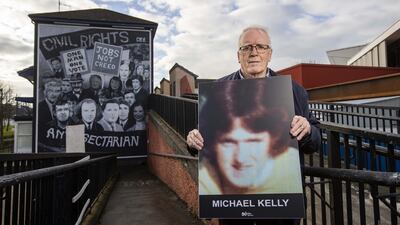The first man shot on January 30, 1972 in the city of Derry – the day of the massacre of 14 civilians by the British Army – cannot quite believe five decades on that he is alive to tell his tale.
The 50th anniversary falls on Sunday and the still divided city will stop to remember the dead and plead once again for the perpetrators to face prosecution.
"I am alive, I can talk … but the families, they have been through hell,’ Damien Donaghy told the Belfast Telegraph newspaper.
Jimmy Duddy, the nephew of John Johnson, who died on the day, remembers that his uncle's last act was to run over to Donaghy after he was shot. Mr Duddy recalled that after the judge-led inquiry that called for the prosecution of one of the servicemen firing that day, he was told by a friend it would never happen.
While the former paratrooper — named only as Soldier F — was charged in 2019 with two murders and four counts of attempted murder, the case was withdrawn last summer.
Kay Duddy, the sister of another victim Jackie, told the same newspaper that those who fired on the crowd of civil rights protesters should take responsibility, even after such a long time. "If you did wrong put your hands up and say I did it for whatever reason," she said in a video. "Jackie has been buried for 50 years but we've never been able to lay him to rest."
The events of the day fuelled Northern Ireland's 30-year spiral of violence between British loyalists and Irish nationalists. A photograph of a local priest, later bishop of the city, Edward Daly, holding up a white handkerchief as he sought to end the killing spree became an enduring image of the whole era.
It has also been marked in the culture, including in the song Sunday Bloody Sunday by U2 and a landmark play of the same name by the playwright Brian Friel, who was educated in Derry. Friel's The Freedom of the City was first staged in the Irish capital Dublin a year to the day of the massacre.
It tells the story of two men and a woman who, seeking shelter amid a protest, find themselves accidentally in the city's main municipal building.
Immediately, it is believed that the three have occupied the building and the play is interspersed with snippets from a hearing into the killing of the three characters by British security forces.
The work addressed the violence of Bloody Sunday while the pain was still raw in Derry and across the island of Ireland.
Fifty years on, some of those involved in the play recalled the power of the first production in the Abbey Theatre in Dublin.

Dermot Crowley, now a successful stage and screen actor, was only starting out in his career when he took the part of a soldier in the play.
“It was a very febrile atmosphere,” he told PA news agency. “Bloody Sunday had happened. Bombs were going off all over Dublin.
“It was like an atomic bomb had gone off. I mean, people couldn’t believe the pictures that we were seeing.”
Nearly 50 years later, Crowley said that he still remembers the intensity of being involved in the production. “From the actor’s point of view, it wasn’t like we were doing a play. It was almost that we were taking part in an event that was kind of reflecting the fear and the violence that was happening at that time, not just in – for want of a better word – the North, but had spread to basically outside our doors at the Abbey Theatre," he recalled. “And so I think that informed everything that we did and that people weren’t coming to see a play for entertainment. It was much more than that.”

Friel, one of the best-known Irish playwrights of all time, died in 2015, and Crowley said that he distinctly remembers the reaction among those who came to see the production in 1973.
“It was electrifying to do. It was it was a thrill to do. There was a sort of a visceral feeling in the audience that they were at something special,” he said.
Crowley, looking back several decades later, thinks the play remains important for what it distilled.
“It was a mirror held up to our immediate times by Brian Friel.”


